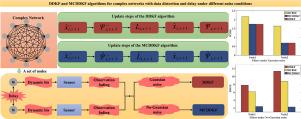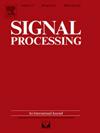State estimation for time-varying complex networks with Gaussian and non-Gaussian noise: Addressing data distortion and delay
IF 3.6
2区 工程技术
Q2 ENGINEERING, ELECTRICAL & ELECTRONIC
引用次数: 0
Abstract
This paper investigates, for the first time, the state estimation (SE) problem in complex networks with data distortion and delay under various noise conditions. To address data distortion and delay effects caused by dynamic bias, observation fading, and random interference, this paper proposes two recursive state estimation algorithms based on Gaussian and non-Gaussian noise assumptions, respectively. Dynamic bias and observation fading are modeled using dynamic equations and a set of independent random variables, leading to the development of a new network system model. In Gaussian noise environments, an optimal data distortion and delay Kalman filter (DDKF) is proposed by improving the SE equations and error covariance bounds of the traditional delay-compensated state estimation (DCBSE) algorithm, significantly enhancing the SE accuracy. For non-Gaussian noise environments, the maximum correntropy criterion (MCC) is employed to maximize the cost function, resulting in the development of the maximum correntropy data distortion and delay Kalman filter (MCDDKF), which further improves the estimation accuracy and robustness of the DDKF under non-Gaussian noise conditions. Simulation results validate the effectiveness and applicability of both algorithms under different noise conditions.

具有高斯和非高斯噪声的时变复杂网络的状态估计:处理数据失真和延迟
本文首次研究了各种噪声条件下具有数据失真和延迟的复杂网络的状态估计问题。为了解决动态偏差、观测衰落和随机干扰引起的数据失真和延迟影响,本文分别提出了两种基于高斯和非高斯噪声假设的递归状态估计算法。利用动态方程和一组独立的随机变量对动态偏置和观测衰落进行建模,从而建立了一种新的网络系统模型。在高斯噪声环境下,通过改进传统延迟补偿状态估计(DCBSE)算法的SE方程和误差协方差界,提出了一种最优的数据失真和延迟卡尔曼滤波器(DDKF),显著提高了SE精度。对于非高斯噪声环境,采用最大相关熵准则(MCC)对代价函数进行最大化,从而开发出最大相关熵数据失真和延迟卡尔曼滤波器(MCDDKF),进一步提高了DDKF在非高斯噪声条件下的估计精度和鲁棒性。仿真结果验证了两种算法在不同噪声条件下的有效性和适用性。
本文章由计算机程序翻译,如有差异,请以英文原文为准。
求助全文
约1分钟内获得全文
求助全文
来源期刊

Signal Processing
工程技术-工程:电子与电气
CiteScore
9.20
自引率
9.10%
发文量
309
审稿时长
41 days
期刊介绍:
Signal Processing incorporates all aspects of the theory and practice of signal processing. It features original research work, tutorial and review articles, and accounts of practical developments. It is intended for a rapid dissemination of knowledge and experience to engineers and scientists working in the research, development or practical application of signal processing.
Subject areas covered by the journal include: Signal Theory; Stochastic Processes; Detection and Estimation; Spectral Analysis; Filtering; Signal Processing Systems; Software Developments; Image Processing; Pattern Recognition; Optical Signal Processing; Digital Signal Processing; Multi-dimensional Signal Processing; Communication Signal Processing; Biomedical Signal Processing; Geophysical and Astrophysical Signal Processing; Earth Resources Signal Processing; Acoustic and Vibration Signal Processing; Data Processing; Remote Sensing; Signal Processing Technology; Radar Signal Processing; Sonar Signal Processing; Industrial Applications; New Applications.
 求助内容:
求助内容: 应助结果提醒方式:
应助结果提醒方式:


